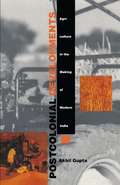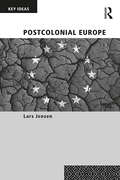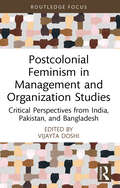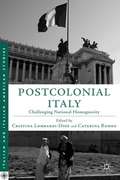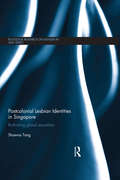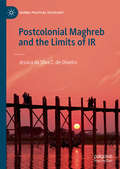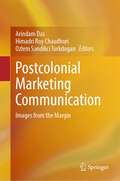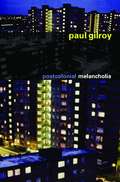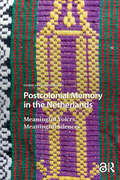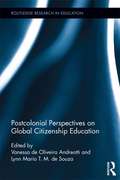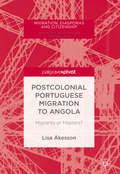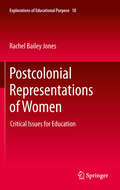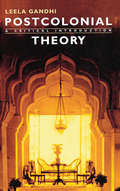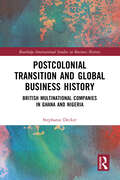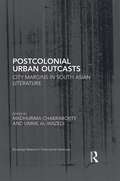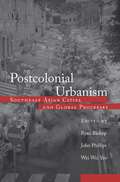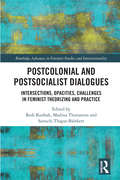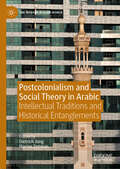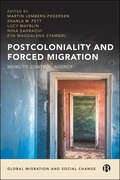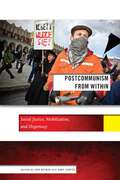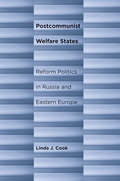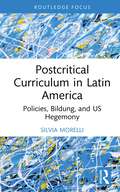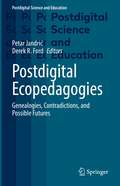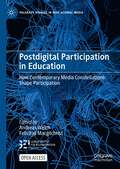- Table View
- List View
Postcolonial Developments: Agriculture in the Making of Modern India
by Akhil GuptaThis definitive study brings together recent critiques of development and work in postcolonial studies to explore what the postcolonial condition has meant to rural people in the Third World. Focusing on local-level agricultural practices in India since the "green revolution" of the 1960s, Akhil Gupta challenges the dichotomy of "developed" and "underdeveloped," as well as the notion of a monolithic postcolonial condition. In so doing, he advances discussions of modernity in the Third World and offers a new model for future ethnographic scholarship. Based on fieldwork done in the village of Alipur in rural north India from the early 1980s through the 1990s, Postcolonial Developments examines development itself as a post-World War II sociopolitical ideological formation, critiques related policies, and explores the various uses of the concept of the "indigenous" in several discursive contexts. Gupta begins with an analysis of the connections and conflicts between the world food economy, transnational capital, and technological innovations in wheat production. He then examines narratives of village politics in Alipur to show how certain discourses influenced governmental policies on the green revolution. Drawing links between village life, national trends, and global forces, Gupta concludes with a discussion of the implications of environmentalism as exemplified by the Rio Earth Summit and an examination of how global environmental treaties may detrimentally affect the lives of subaltern peoples. With a series of subtle observations on rural politics, nationalism, gender, modernization, and difference, this innovative study capitalizes on many different disciplines: anthropology, sociology, comparative politics, cultural geography, ecology, political science, agricultural economics, and history.
Postcolonial Europe (Key Ideas)
by Lars JensenThis book presents an overview of the direct and indirect ways in which Europe continues to be influenced by its entrenched postcolonial condition. Exploring the notion of postcolonial Europe as it characterises a Europe caught at a number of crossroads, it considers the distinctly European features of a range of global crises by which Europe is beset, relating to migration, nationalism, internationalism, climate change and inequality. Linking these to the legacy of European hegemony during the era of high imperialism and the inability to come to terms with the region’s increasingly provincialised status, the reversal of migrant flows following the implosion of European empires, and the dismantling of welfare societies initially made possible by the accumulation of wealth during colonialism, the author examines the gradual disintegration of the idea of the European collectivity and the erosion of the idea that Europe is a dispenser of privileged status. A wide-ranging study of Europe’s crisis in its postcolonial era, this volume will appeal to scholars of critical sociology, political geography, cultural studies, anthropology, political science and history with interests in colonialism and postcolonialism.
Postcolonial Feminism in Management and Organization Studies: Critical Perspectives from India, Pakistan, and Bangladesh (Routledge Focus on Women Writers in Management and Organization Studies)
by Vijayta DoshiThe term feminism is often treated as a stable and universalizing politics and practice. For postcolonial feminism, the issues of interest are not only social and cultural inequalities in terms of caste, class, color, ethnicity, gender, and religion, but also historical, political, and geographical inequalities in terms of “Third World”, “Global South” and “remnants of the colonial past”. Postcolonial feminism pays nuanced attention to historical diversity and local specificity of feminist issues. This book draws upon the work grounded specifically in the context of India, Pakistan, and Bangladesh to demonstrate the plurality of thinking. In mainstream management and organization studies, context is often understood as a present, static field. This book discusses how context is an important consideration for any management and organization study and for feminist studies in management and organization studies. It informs the way we need to understand context not just as “present” but also as “past”. Postcolonial feminism highlights the historical roots and past privileges of a context that often gets overlooked in management and organization studies, where context is mostly understood in the present.This book highlights the contributions of women writers, poets, and activists such as Christina Stringer, Elena Samonova, Gayatri Spivak, Mary Douglas, Naila Kabeer, and Uzma Falak to postcolonial feminism in management and organization studies. Each of these women has engaged with writing that has the potential to enrich and transform understanding of postcolonial feminism in management and organization studies, making this book a valuable resource for researchers, academics, and advanced students.
Postcolonial Italy: Challenging National Homogeneity (Italian and Italian American Studies)
by Cristina Lombardi-Diop Caterina RomeoThis volume constitutes a multidisciplinary intervention into the emerging field of postcolonial studies in Italy, bringing together cultural and social history, critical and political theory, literary and cinematic analyses, ethnomusicology and cultural studies, anthropological fieldwork, and race, gender, diaspora, and urban studies.
Postcolonial Lesbian Identities in Singapore: Re-thinking global sexualities (Routledge Research on Gender in Asia Series)
by Shawna TangTaking lesbians in Singapore as a case study, this book explores the possibility of a modern gay identity in a postcolonial society, that is not dependent on Western queer norms. It looks at the core question of how this identity can be reconciled with local culture and how it relates to global modernities and dominant understandings of what it means to be queer. It engages with debates about globalization, post-colonialism and sexuality, while emphasising the specificity, diversity and interconnectedness of local lesbian sexualities.
Postcolonial Maghreb and the Limits of IR (Global Political Sociology)
by Jessica da OliveiraThis book explores narratives produced in the Maghreb in order to illustrate shortcomings of imagination in the discipline of international relations (IR). It focuses on the politics of narrating postcolonial Maghreb through a number of writers, including Abdelkebir Khatibi, Fatema Mernissi, Kateb Yacine and Jacques Derrida, who explicitly embraced the task of (re)imagining their respective societies after colonial independence and subsequent nation-building processes. Narratives are thus considered political acts speaking to the turbulent context in which postcolonial Maghrebian Francophone literature emerges as sites of resistance and contestation. Throughout the chapters, the author promotes an encounter between narratives from the Maghreb and IR and makes a case for the kinds of thinking and writing strategies that could be used to better approach international and global studies.
Postcolonial Marketing Communication: Images from the Margin
by Arindam Das Himadri Roy Chaudhuri Ozlem Sandikci TurkdoganThis volume approaches marcomm (marketing communication) from the phenomenology of markets in the context of the Global South and its postcolonial experiences. It provides a fresh perspective to the current paradigm and offers a fresh discourse on the current theories of marketing communication. The book demonstrates how marketing communication, an essentially Global North discourse reinforcing hegemony, can be critiqued and deconstructed when subjected to postcolonial critical analysis. Recognizing as commonplace, the Global South has either willingly embraced or been ideologically coerced into adopting a Western marketing communication system. This system is evident in its theories and practices, mirroring Western themes, symbols, stories, and knowledge frameworks, consequently fostering subjectivities that lack critical self-reflection and are dependent on Western influences. But what remains more interesting is how such an ideological system, mediated through a quintessential Global South modernity, generates a new habitation of modernity at the margin. Essentially a reaction from the Global South perspective, the book thoroughly examines the realities around marketing communication discourses. The book even engenders alternatives to hegemonic marketing communication discourses and a set of “other” epistemologies of alternate modernities of equity and justice. From African to Turkish, from Indian to Canadian first nations, Australian Aborigines to Polynesian-American, postcolonial subjectivities through marcomm across the globe get a voice in the volume. The collection in this volume is a decolonizing attempt that thwarts cultural globalization, examines colonial discourses, cuts across essentialized identities, mobilizes resistance, interrogates power structures and mechanisms of knowledge production, dissemination, and legitimization, and celebrates the new-formed cultural identity of the Third/Fourth World. The book is essential read for researchers, students and practitioners of Marketing who wish to gain a deeper understanding of an oft ignored aspect of marcomm.
Postcolonial Melancholia (The Wellek Library Lectures)
by Paul GilroyIn an effort to deny the ongoing effect of colonialism and imperialism on contemporary political life, the death knell for a multicultural society has been sounded from all sides. That's the provocative argument Paul Gilroy makes in this unorthodox defense of the multiculture. Gilroy's searing analyses of race, politics, and culture have always remained attentive to the material conditions of black people and the ways in which blacks have defaced the "clean edifice of white supremacy." In Postcolonial Melancholia, he continues the conversation he began in the landmark study of race and nation 'There Ain't No Black in the Union Jack' by once again departing from conventional wisdom to examine—and defend—multiculturalism within the context of the post-9/11 "politics of security."This book adapts the concept of melancholia from its Freudian origins and applies it not to individual grief but to the social pathology of neoimperialist politics. The melancholic reactions that have obstructed the process of working through the legacy of colonialism are implicated not only in hostility and violence directed at blacks, immigrants, and aliens but in an inability to value the ordinary, unruly multiculture that has evolved organically and unnoticed in urban centers. Drawing on the seminal discussions of race begun by Frantz Fanon, W. E. B. DuBois, and George Orwell, Gilroy crafts a nuanced argument with far-reaching implications. Ultimately, Postcolonial Melancholia goes beyond the idea of mere tolerance to propose that it is possible to celebrate the multiculture and live with otherness without becoming anxious, fearful, or violent.
Postcolonial Memory in the Netherlands: Meaningful Voices, Meaningful Silences (Heritage and Memory Studies)
by Gerlov EngelenhovenThis book is about postcolonial memory in the Netherlands. This term refers to conflicts in contemporary society about how the colonial past should be remembered. The question is often: who has the right or ability to tell their stories and who do not? In other words: who has a voice, and who is silenced? As such, these conflicts represent a wider tendency in cultural theory and activism to use voice as a metaphor for empowerment and silence as voice’s negative counterpart, signifying powerlessness. And yet, there are voices that do not liberate us from, but rather subject us to power. Meanwhile, silence can be powerful: it can protect, disrupt and reconfigure. Throughout this book, it will become clear how voice and silence function not as each other’s opposites, but as each other’s continuation, and that postcolonial memory is articulated through the interplay of meaningful voices and meaningful silences.
Postcolonial Perspectives on Global Citizenship Education (Routledge Research in Education)
by Vanessa de Oliveira Andreotti Lynn Mario T. M. de SouzaThis volume bridges the gap between contemporary theoretical debates and educational policies and practices. It applies postcolonial theory as a framework of analysis that attempts to engage with and go beyond essentialism, ethno- and euro-centrisms through a critical examination of contemporary case studies and conceptual issues. From a transdisciplinary and post-colonial perspective, this book offers critiques of notions of development, progress, humanism, culture, representation, identity, and education. It also examines the implications of these critiques in terms of pedagogical approaches, social relations and possible future interventions.
Postcolonial Portuguese Migration to Angola: Migrants or Masters? (Migration, Diasporas and Citizenship)
by Lisa ÅkessonGrounded in extensive and original ethnographic fieldwork, this book makes a novel contribution to migration studies by examining a European labour migration to the Global South, namely contemporary Portuguese migration to Angola in a postcolonial context. In doing so, it explores everyday encounters at work between the Portuguese migrants and their Angolan “hosts”, and it analyses how the Luso-African postcolonial heritage interplays with the recent Portuguese-Angolan migration in the (re-)construction of power relations and identities. Based on ethnographic interviews, the book describes the Angolan-Portuguese relationship as characterized not only by hierarchies of power, but also by ambivalence and hybridity. This research demonstrates that the identities of the ex-colonized Angolan and the Portuguese ex-colonizer are shaped by a history of unequal and violent power relations. Further, it reveals how this history has produced a sense of intimacy between the two, and the often fraught nature of this relationship. Combining a strong connection to the field of migration studies with a postcolonial perspective, this original work will appeal to students and scholars of migration, postcolonial studies, the sociology of work and African Studies.
Postcolonial Representations of Women: Critical Issues for Education
by Rachel Bailey JonesIn this accessible combination of post-colonial theory, feminism and pedagogy, the author advocates using subversive and contemporary artistic representations of women to remodel traditional stereotypes in education. It is in this key sector that values and norms are molded and prejudice kept at bay, yet the legacy of colonialism continues to pervade official education received in classrooms as well as 'unofficial' education ingested via popular culture and the media. The result is a variety of distorted images of women and gender in which women appear as two-dimensional stereotypes. The text analyzes both current and historical colonial representations of women in a pedagogical context. In doing so, it seeks to recast our conception of what 'difference' is, challenging historical, patriarchal gender relations with their stereotypical representations that continue to marginalize minority populations in the first world and billions of women elsewhere. These distorted images, the book argues, can be subverted using the semiology provided by postcolonialism and transnational feminism and the work of contemporary artists who rethink and recontextualize the visual codes of colonialism. These resistive images, created by women who challenge and subvert patriarchal modes of representation, can be used to create educational environments that provide an alternative view of women of non-western origin.
Postcolonial Theory: A critical introduction
by Leela GandhiPostcolonial Theory is a ground-breaking critical introduction to the burgeoning field of postcolonial studies.Leela Gandhi is the first to clearly map out this field in terms of its wider philosophical and intellectual context, drawing important connections between postcolonial theory and poststructuralism, postmodernism, marxism and feminism. She assesses the contribution of major theorists such as Edward Said, Gayatri Spivak and Homi Bhabha, and also points to postcolonialism's relationship to earlier thinkers such as Frantz Fanon and Mahatma Gandhi.The book is distinctive in its concern for the specific historical, material and cultural contexts for postcolonial theory, and in its attempt to sketch out the ethical possibilities for postcolonial theory as a model for living with and 'knowing' cultural differences non-violently.Postcolonial Theory is a useful starting point for readers new to the field and a provocative account which opens possibilities for debate.
Postcolonial Transition and Global Business History: British Multinational Companies in Ghana and Nigeria (Routledge International Studies in Business History)
by Stephanie DeckerBritish multinationals faced unprecedented challenges to their organizational legitimacy in the middle of the twentieth century as the European colonial empires were dismantled and institutional transformations changed colonial relationships in Africa and other parts of the world. This book investigates the political networking and internal organizational changes in five British multinationals (United Africa Company, John Holt & Co., Ashanti Goldfields Corporation, Bank of West Africa and Barclays Bank DCO). These firms were forced to adapt their strategies and operations to changing institutional environments in two English-speaking West African countries, Ghana (formerly the Gold Coast) and Nigeria, from the late 1940s to the late 1970s. Decolonization meant that formerly imperial businesses needed to develop new political networks and change their internal organization and staffing to promote more Africans to managerial roles. This postcolonial transition culminated in indigenization programmes (and targeted nationalizations) which forced foreign companies to sell equity and assets to domestic investors in the 1970s. Postcolonial Transition and Global Business History is the first in-depth historical study on how British firms sought to adapt over several decades to rapid political and economic transformation in West Africa. Exploring both postcolonial transitions and development discourse, this book addresses the topics with regard to business and economic history and will be of interest to researchers, academics, and students in the fields of organizational change, political economy, African studies and globalization.
Postcolonial Urban Outcasts: City Margins in South Asian Literature (Routledge Research in Postcolonial Literatures)
by Madhurima Chakraborty Umme Al-WazediExtending current scholarship on South Asian Urban and Literary Studies, this volume examines the role of the discontents of the South Asian city. The collection investigates how South Asian literature and literature about South Asia attends to urban margins, regardless of whether the definition of margin is spatial, psychological, gendered, or sociopolitical. That cities are a site of profound paradoxes is nowhere clearer than in South Asia, where urban areas simultaneously represent both the frontiers of globalization as well as the deeply troubling social and political inequalities of the global south. Additionally, because South Asian cities are defined by the palimpsestic confluence of, among other things, colonial oppression, anticolonial nationalism, postcolonial governance, and twenty-first century transnational capital, they are sites where the many faces of empowerment and disempowerment are elaborated. The volume brings together essays that emphasize myriad critical approaches—geospatial, urban-theoretical, diasporic, subaltern, and others. United in their critical empathy for urban outcasts, the chapters respond to central questions such as: What is the relationship between the politico-economic narratives of globally emerging South Asian cities and the dispossessed? How do South Asian cities stand in relationship to the nation and, conversely, how might South Asians in diaspora construct these cities within larger narratives of development, globalization, or as sources of authentic ethnic identities? How is the very skeleton—the space, the territory—of South Asian cities marked with and by exclusionary politics? How do the aesthetic and formal choices undertaken by writers determine the potential for and limit to emancipation of urban outcasts from their oppressive circumstances? Considering fiction, nonfiction, comics, and genre fiction from India, Pakistan, Bangladesh, and Sri Lanka; literature from the twentieth and the twenty-first century; and works that are Anglophone and those that are in translation, this book will be valuable to a range of disciplines.
Postcolonial Urban Outcasts: City Margins in South Asian Literature (Routledge Research in Postcolonial Literatures)
by Madhurima Chakraborty Umme Al-WazediExtending current scholarship on South Asian Urban and Literary Studies, this volume examines the role of the discontents of the South Asian city. The collection investigates how South Asian literature and literature about South Asia attends to urban margins, regardless of whether the definition of margin is spatial, psychological, gendered, or sociopolitical. That cities are a site of profound paradoxes is nowhere clearer than in South Asia, where urban areas simultaneously represent both the frontiers of globalization as well as the deeply troubling social and political inequalities of the global south. Additionally, because South Asian cities are defined by the palimpsestic confluence of, among other things, colonial oppression, anticolonial nationalism, postcolonial governance, and twenty-first century transnational capital, they are sites where the many faces of empowerment and disempowerment are elaborated. The volume brings together essays that emphasize myriad critical approaches—geospatial, urban-theoretical, diasporic, subaltern, and others. United in their critical empathy for urban outcasts, the chapters respond to central questions such as: What is the relationship between the politico-economic narratives of globally emerging South Asian cities and the dispossessed? How do South Asian cities stand in relationship to the nation and, conversely, how might South Asians in diaspora construct these cities within larger narratives of development, globalization, or as sources of authentic ethnic identities? How is the very skeleton—the space, the territory—of South Asian cities marked with and by exclusionary politics? How do the aesthetic and formal choices undertaken by writers determine the potential for and limit to emancipation of urban outcasts from their oppressive circumstances? Considering fiction, nonfiction, comics, and genre fiction from India, Pakistan, Bangladesh, and Sri Lanka; literature from the twentieth and the twenty-first century; and works that are Anglophone and those that are in translation, this book will be valuable to a range of disciplines.
Postcolonial Urbanism: Southeast Asian Cities and Global Processes
by John Phillips Ryan Bishop Wei-Wei YeoA common assumption about cities throughout the world is tht they are essentially an elaboration of the Euro-American model. Postcolonial Urbanism demonstrates the narrowness of this vision. Cities in the postcolonial world, the book shows, are producing novel forms of urbanism not reducible to Western urbanism. Despite being heavily colonized in the past, Southeast Asia has been largely ignored in discussions about postcolonial theory and in general considerations of global urbanism. An international cast of contributors focuses on the heavily urbanized world region of Southeast Asia to investigate the novel forms of urbanism germinating in postcolonial settings such as Indonesia, Thailand, Singapore, Hanoi, and the Philippines. Offering a mix of theoretical perspectives and empirical accounts, Postcolonial Urbanism presents a panoramic view of the cultures, societies, and politics of the postcolonial city.
Postcolonial and Postsocialist Dialogues: Intersections, Opacities, Challenges in Feminist Theorizing and Practice (Routledge Advances in Feminist Studies and Intersectionality)
by Redi KoobakThrough staging dialogues between scholars, activists, and artists from a variety of disciplinary, geographical, and historical specializations, Postcolonial and Postsocialist Dialogues explores the possible resonances and dissonances between the postcolonial and the postsocialist in feminist theorizing and practice. While postcolonial and postsocialist perspectives have been explored in feminist studies, the two analytics tend to be viewed separately. This volume brings together attempts to understand if and how postcolonial and postsocialist dimensions of the human condition - historical, existential, political, and ideological - intersect and correlate in feminist experiences, identities, and struggles. In the three sections that probe the intersections, opacities, and challenges between the two discourses, the authors put under pressure what postcolonialism and postsocialism mean for feminist scholarship and activism. The contributions address the emergence of new political and cultural formations as well as circuits of bodies and capital in a post-Cold War and postcolonial era in currently re-emerging neo-colonial and imperial conflicts. They engage with issues of gender, sexuality, race, migration, diasporas, indigeneity, and disability, while also developing new analytical tools such as postsocialist precarity, queer postsocialist coloniality, uneventful feminism, feminist opacity, feminist queer crip epistemologies. The collection will be of interest for postcolonial and postsocialist researchers, students of gender studies, feminist activists and scholars.
Postcolonialism and Social Theory in Arabic: Intellectual Traditions and Historical Entanglements (The Modern Muslim World)
by Dietrich Jung Florian ZemminSince Edward Said’s publication of Orientalism in 1978, so-called Western social theory and its claim to universal analytical validity has been exposed to severe criticism. Scholars from the field of postcolonial studies were most vocal in criticizing the Eurocentric nature of the conceptual apparatus of the social sciences. Indeed, contemporary social theory almost exclusively refers to the historical experiences of Western Europe and North America. Yet what is the alternative to these Eurocentric frameworks? Many postcolonial critics use very few non-English sources and tend to focus on the deconstruction of European and American theories. This chapters of this volume provide a turn of perspective. The authors critically reflect upon the concepts of so-called Western social theory by engaging with social science literature and social theory in Arabic. Questions addressed include: What are the concepts, themes, and historical narratives in contemporary Arabic social theory? In which ways do Arab social theorists provide us with alternatives to the conceptual apparatuses employed by so-called Western social theory? To what extent are Arab and Western social theories entangled with each other?
Postcoloniality and Forced Migration: Mobility, Control, Agency (Global Migration and Social Change)
by Martin Lemberg-Pedersen, Sharla M. Fett, Lucy Mayblin, Nina Sahraoui and Eva Magdalena StambølThis powerful book explicates the many ways in which colonial encounters continue to shape forced migration, ever evolving with times and various geographical contexts. Bringing historians, political scientists, sociologists, anthropologists and criminologists together, the book presents examples of forced migration events and politics ranging from the 18th century to the practices and geopolitics of the present day. These case studies, covering Europe, Africa, North America, Asia and South America, are then put in dialogue with each other to propose new theoretical and real-world agendas for the field. As the pervasive legacies of colonialism continue to shape global politics, this unprecedented book moves beyond critique, ahistoricity and Eurocentrism in refugee and forced migration studies and establishes postcoloniality and forced migration as an important field of migration research.
Postcommunism from Within: Social Justice, Mobilization, and Hegemony (Social Science Research Council #8)
by Jan Kubik Amy LinchWhile the decline of communism in the late twentieth century brought democracy, political freedom, and better economic prospects for many people, it also produced massive social dislocation and engendered social problems that were far less pronounced under the old regimes. The fall of state socialism led to enormously complex political, economic, social, and cultural transformations, and while political liberalization was a lofty goal, it was neither uniform in its effects nor unqualified in its benefits. Postcommunism from Within foregrounds the diversity of the historical experiences and current realities of people in the postcommunist region in examining how they are responding to these monumental changes at home. The original essays in this volume lay out a bold new approach to research on the postcommunist region, and to democratization studies more broadly, that focuses on the social and cultural microprocesses behind political and economic transformation. Thematic essays by eminent scholars of postcommunism from across the social sciences are supported by case studies to demonstrate the limitations of current democratization paradigms and suggest ways of building categories of research that more closely capture the role of vernacular knowledge in demanding, creating, and adapting to institutional change. A novel approach to understanding one of the greatest political and social transformations in recent history, Postcommunism from Within explores not just how citizens respond to political and economic restructuring engineered at the top but also how people enact their own visions of life, politics, and justice by responding to daily challenges.
Postcommunist Welfare States: Reform Politics in Russia and Eastern Europe
by Linda J. CookIn the early 1990s, the countries of the former Soviet Bloc faced an urgent need to reform the systems by which they delivered broad, basic social welfare to their citizens. Inherited systems were inefficient and financially unsustainable. Linda J. Cook here explores the politics and policy of social welfare from 1990 to 2004 in the Russian Federation, Poland, Hungary, Belarus, and Kazakhstan. Most of these countries, she shows, tried to institute reforms based on a liberal paradigm of reduced entitlements and subsidies, means-testing, and privatization. But these proposals provoked opposition from pro-welfare interests, and the politics of negotiating change varied substantially from one political arena to another. In Russia, for example, liberalizing reform was blocked for a decade. Only as Vladimir Putin rose to power did the country change its inherited welfare system. Cook finds that the impact of economic pressures on welfare was strongly mediated by domestic political factors, including the level of democratization and balance of pro- and anti-reform political forces. Postcommunist welfare politics throughout Russia and Eastern Europe, she shows, are marked by the large role played by bureaucratic welfare stakeholders who were left over from the communist period and, in weak states, by the development of informal processes in social sectors.
Postcritical Theory and Curriculum in Latin America: Policies, Bildung, and US Hegemony (Studies in Curriculum Theory Series)
by Silvia MorelliThis book, drawing on a range of postcritical theories including postmodernism, poststructuralism, and postcolonialism, provides a comprehensive analysis of the current state of curriculum in Latin America.The book underscores the relationship between curriculum, didactics, and Bildung in the Latino field, acknowledging the hegemony of the United States. It initiates dialogues between scholars from various Latin American countries, promoting the concept of translation and the didactic tradition as a political practice. This practice enables the identification of new scopes and a privileged language, challenging the dominant paradigms and offering fresh perspectives. Recognizing the need for intervention, the book depicts the intellectual history of the field in Argentina and across Latin America. It serves as a critical resource for understanding the complexities and nuances of curriculum studies in the region.This work will appeal to curriculum studies scholars, researchers, faculty, and postgraduate students worldwide. It offers a unique lens to view and understand the educational landscape in Latin America, making it an indispensable addition to the discourse on curriculum studies and educational research. It challenges readers to rethink traditional approaches and explore new avenues in curriculum studies.
Postdigital Ecopedagogies: Genealogies, Contradictions, and Possible Futures (Postdigital Science and Education)
by Petar Jandrić Derek R. FordThis book conceptualizes ecopedagogies as forms of educational innovation and critique that emerge from, negotiate, debate, produce, resist, and/or overcome the shifting and expansive postdigital ecosystems of humans, machines, nonhuman animals, objects, stuff, and other forms of matter. Contemporary postdigital ecosystems are determined by a range of new bioinformational reconfigurations in areas including capitalism, imperialism, settler-colonialism, and ontological hierarchies more generally. Postdigital ecopedagogies name a condition, a question, and a call for experimentation to link pedagogical research and practice to challenges of our moment. They pose living, breathing, expanding, contracting, fluid, and spatial conditions and questions of our non-chronological present. This book presents analyses of that present from a wide spectrum of disciplines, including but not limited to education studies, philosophy, politics, sociology, arts, and architecture.
Postdigital Participation in Education: How Contemporary Media Constellations Shape Participation (Palgrave Studies in Educational Media)
by Andreas Weich Felicitas MacgilchristThis open access book examines the interrelations and correlations of the postdigital condition and its relationship to education, with a particular focus on participation. Contributions reflect on how educational institutions are affected by the recent transformations of media technologies and practices, and how at the same time institutions such as schools and universities are supposed to enable people to participate in media practices in an informed and reflective way. How, and under what conditions, can teachers and students participate in contemporary media constellations? The book will be of interest to academics and researchers involved in teacher education, digital pedagogy, educational technology, instructional design, education philosophy and media education.
